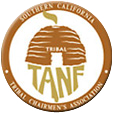by David Wolf Diaz
The Substance Abuse Committee serves the Southern California Tribal Chairman’s Association. The Southern California Tribal Chairmen’s Association (SCTCA) is a multi-service non-profit corporation established in 1972 for a consortium of 19 federally-recognized Indian tribes in Southern California. The primary mission of SCTCA is to serve the health, welfare, safety, education, cultural, economic and employment needs of its tribal members and descendants in the San Diego County urban areas. A board of directors comprised of tribal chairpersons from each of its member Tribes governs SCTCA.
SCTCA coordinates and administers numerous grant programs for its members and the southern California Indian community, including: Tribal Temporary Assistance to Needy Families(TANF), Law Enforcement, Food Commodities, Information Technology Services, Rincon Community Day Care, Adult Vocational Training, Career Development Center, Low Income Home Energy Assistance Program(LIHEAP), the Library Program, Child Care Development Services, Tribal Digital Village (TDV) and Resource Prevention Program.
The Substance Abuse Committee is comprised of five members as listed Mark Romero who is the Tribal Chairman from the Mesa Grande Reservation, Anthony Pico who is the Tribal Chairman from the Vejas Reservation, Eric La Chappa who is the Secretary/Treasurer from La Posta Reservation, and David “Wolf” Diaz who is the Founder and President of Walk of the Warrior. The Substance Abuse Committee meets on the first Friday of every month and focuses on education, prevention, resources, awareness, and treatment to the overwhelming drug and alcohol problems that afflict the reservations of SCTCA. Chairman Mark Romero and David “Wolf” Diaz travel through out the United States to various conferences, workshops, seminars, and trainings to learn the latest evidence based modalities in regards to bringing recovery and wellness to Indian Country. Upon gathering this information it is formed into a Substance Abuse Committee update report which is then read and discussed at a monthly Board meeting for SCTCA in hopes that the information makes a positive difference in each Indian community.
These monthly update reports will now be available for your viewing in this Recovery section of Indian Voices and letting you know that there are great achievements and efforts being done to alleviate this growing problem of drug and alcohol abuse in Indian Country.
Chairman Mark Romero and I attended an Indian Country Training presented by the Lamar Associates in Scottsdale Arizona from November 13th through the 15th. The topic for the training was Drugs of Abuse / Identification and Abatement in Tribal Housing Communities. At the training we gained useful skills and information in regards to the overall substance abuse issues and impacts in tribal housing communities, how to identify legal and illegal substance abuse, and how drugs are endangering the tribal housing environment. The interactive training program provided effective problem-solving strategies and we gained familiarity with next-step resources. A copy of the presentation ona CD disc which covers all the information will be provided at the next board meeting.
On November 16th the Substance Abuse Committee met and discussed the idea of a Treatment Facility located at the Pala Reservation. On October 31, 2012 I received a reply letter from the Pala Band of Mission Indians stating that the Executive Committee is interested in the idea and more will be revealed on a future date.
Walk of the Warrior and the newspaper Indian Voices have reached an agreement to collaborate by creating a section in the Indian Voices Media project devoted to recovery in Indian Country. The collaboration will include articles dealing with education, awareness, prevention, treatment and resources related to recovery in Indian Country. It is our intention to bring wellness to the Indian community challenged with this issue.
We will to the best of our ability deliver this information in a good and humble way, in a sacred manner, with respect to our culture. Any suggestions, comments or ideas from the community are welcomed and can be emailed to David Wolf Diaz, This email address is being protected from spambots. You need JavaScript enabled to view it. or Rose Davis, This email address is being protected from spambots. You need JavaScript enabled to view it..






